












Why choose Mayafriends?
Mayafriends use local knowledge and international support to make a sustainable effort in the mayan community.



Contact Info
Tel: +47 33 45 20 12
Mob: +47 45 20 59 97
Org.nr.: 998 762 227
Bank account: 2500.23.03690
IBAN: NO23 2500 2303 690
SWIFT/BIC: ANBUN021


Social



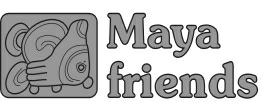
Vision for the Community Centre

Viktor Chavarria
14.10.2013, The Community Centre near Lago Izabal
Knowledge, Information, Health
Education, Care and Enthusiasm
EqualsProgress
Vision for the Community Centre
The project supplies a remote healthcare and education center (under construction) with electricity generated by photovoltaics (PV). The project aims to introduce PV power generation as a viable and clean power source to the indigenous population living nearby. The center is located near Lago Izabal, Guatemala. It will provide free basic health care and education about environmentally friendly behavior and self-sufficient practices to the local indigenous population (6 villages, 300 families each).
Visitors of the center will get in contact with PV by seeing the solar panels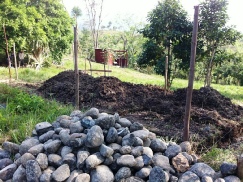 , charging their cellphones at the public PV powered charging station and get information about PV on posters and in courses at the center. Interested teenagers will be able to learn how to assemble small, affordable PV lighting systems. The project will be implemented in 4 steps: First, on site conditions will be verified, dimensions of the center measured, the best location for water pump, cellphone charging station and the solarpanels identified. Second, the whole system will be planned in detail, including the sourcing of materials (high quality, low cost). Last, the system will be installed and launched. An education package will be formulated in cooperation with a local partner, aimed at local high school students and the general public. Once finalized, the project will support the center fully with solar energy. As a flagship project in the region, it will spread the idea of PV as power source. It will lower the carbon footprint of the center (estimated fuel saving: 5000 l diesel per year), it will sensitize the locals (without connection to the electrical grid) to the topic of energy consumption and the importance of renewable energies. In addition, it has the potential to create new jobs for students who could start a business selling self assembled lighting systems.The project does not only implement new technologies per se but at the implementation site this technology is not well known yet. The project integrates the question of energy supply into the wider context of living self sufficiently while leaving a low ecological footprint. It innovatively creates contact between people and green technology and aims to create acceptance through interaction and education. The healthcare and education center will be run by solar electricity only; the PV system will power light, fans,two laptops, two fridges, a beamer for educational purposes, and it will be dimensioned to leave room for connecting additional appliances. The system will integrate four different applications of solar electricity, namely power supply for the building, a water pumping system, a public cell phone charging station and an outdoor solar light as example for the miniature system which will be built by interested teenagers. The teenagers who will learn how to assemble small home-lighting systems will have a platform for selling their off grid power plants and will meet open ears and eyes since people already are familiar with the idea of PV.
, charging their cellphones at the public PV powered charging station and get information about PV on posters and in courses at the center. Interested teenagers will be able to learn how to assemble small, affordable PV lighting systems. The project will be implemented in 4 steps: First, on site conditions will be verified, dimensions of the center measured, the best location for water pump, cellphone charging station and the solarpanels identified. Second, the whole system will be planned in detail, including the sourcing of materials (high quality, low cost). Last, the system will be installed and launched. An education package will be formulated in cooperation with a local partner, aimed at local high school students and the general public. Once finalized, the project will support the center fully with solar energy. As a flagship project in the region, it will spread the idea of PV as power source. It will lower the carbon footprint of the center (estimated fuel saving: 5000 l diesel per year), it will sensitize the locals (without connection to the electrical grid) to the topic of energy consumption and the importance of renewable energies. In addition, it has the potential to create new jobs for students who could start a business selling self assembled lighting systems.The project does not only implement new technologies per se but at the implementation site this technology is not well known yet. The project integrates the question of energy supply into the wider context of living self sufficiently while leaving a low ecological footprint. It innovatively creates contact between people and green technology and aims to create acceptance through interaction and education. The healthcare and education center will be run by solar electricity only; the PV system will power light, fans,two laptops, two fridges, a beamer for educational purposes, and it will be dimensioned to leave room for connecting additional appliances. The system will integrate four different applications of solar electricity, namely power supply for the building, a water pumping system, a public cell phone charging station and an outdoor solar light as example for the miniature system which will be built by interested teenagers. The teenagers who will learn how to assemble small home-lighting systems will have a platform for selling their off grid power plants and will meet open ears and eyes since people already are familiar with the idea of PV.
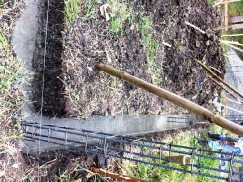 The cell phone charging station is an adaption of the successful NAFORE project by MicroSow and Afrisolar in Bukina Faso, Africa, which is running there successfully for years and now gets introduced into Guatemala for the first time. Since the project is anchored at a place which is dedicated to the well being and prosperity of the local indigenous population, and which is aiming at being a social center in the region, it is an ideal point of dissemination for PV installations. The center will be a lighthouse project to show energy supply is possible using 100% regenerative methods, which preserve the global and local environment. By getting in contact with the PV electricity production naturally by visiting the center the local population is introduced to the topic on three different levels: they interact by seeing the and profiting from the center, they get closer by having the opportunity to charge their cell phones with the power of the sun directly themselves, and if interested have the possibility to learn more about the ecological and economical benefits of power supply by PV.
The cell phone charging station is an adaption of the successful NAFORE project by MicroSow and Afrisolar in Bukina Faso, Africa, which is running there successfully for years and now gets introduced into Guatemala for the first time. Since the project is anchored at a place which is dedicated to the well being and prosperity of the local indigenous population, and which is aiming at being a social center in the region, it is an ideal point of dissemination for PV installations. The center will be a lighthouse project to show energy supply is possible using 100% regenerative methods, which preserve the global and local environment. By getting in contact with the PV electricity production naturally by visiting the center the local population is introduced to the topic on three different levels: they interact by seeing the and profiting from the center, they get closer by having the opportunity to charge their cell phones with the power of the sun directly themselves, and if interested have the possibility to learn more about the ecological and economical benefits of power supply by PV.
Mayafriends is a Norway based NGO, is dedicated to support the indigenous population of Guatemala. In the past, they conducted various education programs and field hospitals for the indigenous population of Guatemala. Since Mayafriends will run the healthcare and education center, they will be involved in all activities at the center. They will be at the core of the project and will communicate related information to the indigenous people. They will show the visitors of the center that the using green energy and leaving a small eco-footprint is practicable and even advantageous through their example. Mayafriends will take care of all preparations including infrastructure and purchase of construction materials, the maintenance of the PV system and the educational programs developed in the project. They will be part of developing the education program and will be closely involved into the planning of the system. ISC Konstanz is a non-profit, public benefit NGO based in Germany with about 70 employees, which is dedicated to PV research and the global dissemination of PV. The latter is realized mainly through its developmentcooperation department.
Since 2009, ten projects in Africa, Asia and Latin America have been successfully completed providing PV electricity to remote areas and social projects. Several new projects in South America, Asia and Africa are under preparation at the moment. ISC Konstanz will take care of the dimensioning, layout and planning of the PV installation. ISC will coordinate the purchase of key equipment and donate solar panels to the project. ISC will organize the assembly of the system on site and will teach Mayafriends and a local electrician how to control and maintain the system to guarantee its operation after leaving. The education program will be formulated by ISC in coordination with Mayafriends.
Viktor Moasyr Chavarria, is a well respected personality in the indigenous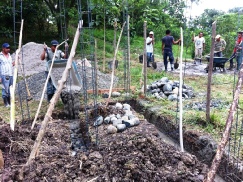 communities surrounding the center. In his role as adviser he already sensitized the people for environmental issues, teaching them e.g. about the effects of using industrially produced detergents for the rivers. Making them aware of the vulnerability of nature against industrially produced goods was a starting point to remind and teach the locals about how they traditionally produced soap using nuts which do not cause damage to their habitat. Viktor also provided fuel-saving stoves to the communities. Setting theses stoves into houses of respected community figures many people followed their examples after seeing the benefits. Being already well known in the region he is a perfect personality to introduce regenerative energy production and responsible consumption to the locals.
communities surrounding the center. In his role as adviser he already sensitized the people for environmental issues, teaching them e.g. about the effects of using industrially produced detergents for the rivers. Making them aware of the vulnerability of nature against industrially produced goods was a starting point to remind and teach the locals about how they traditionally produced soap using nuts which do not cause damage to their habitat. Viktor also provided fuel-saving stoves to the communities. Setting theses stoves into houses of respected community figures many people followed their examples after seeing the benefits. Being already well known in the region he is a perfect personality to introduce regenerative energy production and responsible consumption to the locals.
Viktor's team include Marit Grimsrud, Erik Lovmo, Solfrid Rismyhr, Espen & Asbjorg Halvorsen from the board of directors of Mayafriends,Tobias Klaus is head of the development cooperation department of ISC Konstanz. His knowledge of planning and implementing PV power plants in the developing world, and his interest in education and dissemination makes him the perfect person to coordinate those tasks for ISC Konstanz.
Monika Sarkardi is also a member of ISC´s development cooperation department. Her background as an anthropologist helps her to understand cultural differences and build bridges to mutual understanding.
Andreas Halm is a researcher at ISC Konstanz who is knowledgeable about PV power generation and education of interns. During a one year stay in Guatemala he worked together with Viktor in field clinics. He speaks Spanish fluently and can mediate between the parties if misunderstandings occur.
The main problem is the electricity supply. An off grid system impacting the environment as little as possible is needed, to encourage the rural population to copy that behavior making them understand that it is in their own interest because it will preserve their traditional habitat.
Main objectives:
- 100% electricity from PV for the center -> giving the example that regenerative electricity is possible without pollution of the natural habitat.
- Solar fridge for medicine -> poor healthcare service is strengthened, cool vaccines and anti venom will help to save lives.
- Cell phone charging station -> first contact with PV for people who live off grid and have no sensibility for the pros and cons of consumer articles.
- Education program -> locals often show polluting habits without being aware of the impact of their actions. Education will make them aware of the matter and gives them the chance to understand that protecting their immediate environment is in their own interest since they liveclosely with nature.
- Solar pump -> will guarantee independent water supply without the use of a diesel generator.
- Solar light -> first electrical appliance which can be introduced to families helping them to have light at night without the drawbacks of fuel based lamps.
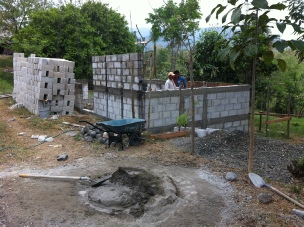 Who will benefit from this project?
Who will benefit from this project?
The first direct beneficiary of the project is the healthcare and education center and the people who run it. For the center personnel working conditions will be improved significantly as there is no disturbing noise from the dieselgenerators. Consistent with the idea of the center, it will run self sufficiently and 100% on regenerative energy, saving roughly 5000l diesel fuel a year resulting in 6400 Dollars of savings. With this money, Mayafriends can further invest in their activities. As a direct result from this, all the visitors and clients of the center, potentially around 9000 people living in the intermediate surroundings, will benefit from the project. People can take advantage of the education program and can start to assemble and sell small solar systems to possibly make a living of it. People can charge their cell phones for free. The healthcare center will be able to store e.g. anti venom to provide emergency treatments to people with snake bites.
Indirect beneficiaries: Individuals and organizations that are potential beneficiaries and by which the project results will have a direct impact (No more than 300 words).
Constructed as a community project, there are only few indirect beneficiaries. Indirectly, the whole region and the country indeed profit from the project as it sets an example which can be replicated easily.
Measurable results:
- 100% power supply for the center.
- Water supply met by the PV powered pump.
- Solar rooftop has the side benefit of being used as shady waiting place for clients.
- Informative posters are mounted.
- Cell phone charging station is installed, operational and used by visitors.
- Outdoor solar lighting installed and running.
- Education program running and frequently visited.
- Solar Lamp Workshop functional and running
- Visitors of the center discuss about PV and take the discussion home to their villages.
- Long term: locals start to use PV for their own power supply.
Environmental + social impacts
- reduction of pollution in the area, esp. reduction of CO2 emissions and noise
- Introduction of the local community to environmental issues
- PV electricity generation introduced as alternative to the use of generators
- Preservation of the natural environment will help the people living off the land
- Project can potentially help the locals to jump one step in the classical development –straight from no electricity to green energy without taking side steps via fossil fuel power supply which causes pollution
- Educational programs to teach alternative solutions to daily life’s issues which sustain the environment in a healthy shape
After the first years after starting the project people are already exposed to the PV power plant and some will have the small lighting system so they willhave more acceptance to invite continuing project to be realized in their own villages e.g. for running a communal charging station or corn mill. Long term goals will be the communal and private usage of PV power generation by the local population in formof the above mentioned applications like running a communal corn mill or water supply with PV and the installation of small PV home systems and the use of solar lamps by the population of the villages.
The degree of replicability is high. Many NGO´s are located throughout whole Guatemala supporting the local indigenous communities. They are potential adopters for similar projects. Since many Guatemalan indigenous villages are not connected to the grid it is very relevant in all regions to educate the population who´s energy consumption is growing and generally is met by either deforestation or the consumption of fossil fuels. Giving them an alternative and trying to make them understand at the same time that this alternative will enable them to preserve their land and the lifestyle they have been living with the land for generations.
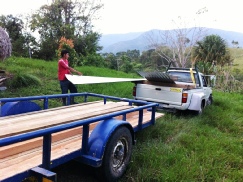 The system will be installed working together with the staff of the center. Short term sustainability will be guaranteed by Mayafriends. A dedicated person will learn how to maintain the system, how to perform routinecheckups and identify potential risks and problems. All critical components of the system will have similar lifetimes; the energy supply of the center should be guaranteed for 30 years.
The system will be installed working together with the staff of the center. Short term sustainability will be guaranteed by Mayafriends. A dedicated person will learn how to maintain the system, how to perform routinecheckups and identify potential risks and problems. All critical components of the system will have similar lifetimes; the energy supply of the center should be guaranteed for 30 years.
Long term sustainability is based on the same foundations as short term sustainability since potential failures do not change over time. The probability of a malfunction might be higher the older the system will be but at the same time,the amount of money which is put aside for maintenance will grow yearly as well.
Development and implementation of a concept for disseminating the idea of green energy production to people mostly without school education living off grid. This concept will partly be developed together with the population based on the Socratic Method, which builds on available local knowledge
- Development and implementation of a concept to teach teenagers on how to assemble a small PV lighting system, together with local teachers and Mayafriends. Ideally this will lead to the establishment of a small student company, therefore, together with the students the market potential and financing concepts for solar lamps will be evaluated
- Development of a maintenance concept for the a local technician and a Mayafriends member, based on material available from the German DGS (http://www.dgs.de/)
- Set up of the system together with Mayafriends and the local population (teamwork)
Based on the many years of experience in similar projects, Mayafriends together with ISC Konstanz will refer to well established procedures for the implementation of this project. Very good knowledge of the technology, supply chains (including alternatives) and a flexible project management easily adaptable to difficult conditions, combined with a strong local foothold are the prerequisite for the success of this project.

Hitcount
Webdesign - © Mayafriends 2012